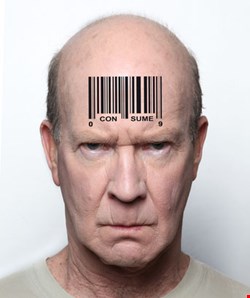
"Our OptimEyes face detection technology is bringing digital, placed based media into a new age of customer insight, measurability, campaign management and optimisation," says the Amscreen (one of Alan Sugar's companies, where his son is chief executive) website. "This revolutionary technology, delivered by leading Face Detection business Quividi, allows advertisers, to accurately measure in real time the type and volume of people that see their ad in any given location and at any time of the day."
OptimEyes is a face detection system that scans people "within its local vicinity," determining the number of possible viewers, the number of actual viewers and their age and sex. This is added to location, time and purchases; and the data sent back to the advertiser.
"Yes, it's like something out of Minority Report," Simon Sugar told The Grocer, "but this could change the face of British retail and our plans are to expand this to as many supermarkets as possible." Brands", he added, "deserve to know not just an estimation of how many eyeballs are viewing their adverts, but who they are too."
He did, however, stress that the system does not invade customer privacy. It doesn't store images or recognize people – just sorts viewers into predefined categories and sends the data to the advertiser.
But privacy campaigners are not happy. Nick Pickles, director of Big Brother Watch, told the Telegraph, "People would never accept the police keeping a real-time log of which shops we go in, but this technology can do just that. It is a surveillance state by the shop door." He pointed out, reports the Telegraph, "more advanced camera technology was already available that matches scans of people's faces when they walk into a shop with their pictures on Facebook to tailor special offers to their 'likes' on the social media website."
The privacy concerns are clear. Since the technology already exists for facial recognition and profile matching, how long will companies like OptimEyes hold out against pressure from big business to provide evermore details on customers for more direct and more targeted advertising? London has already seen recycle bins that have tracked passers-by through their mobile phones and delivered targeted advertising as they pass. Systems like OptimEyes could, in theory, recognize and therefore locate individual shoppers, and deliver targeted advertising based on the store's loyalty card for that person.